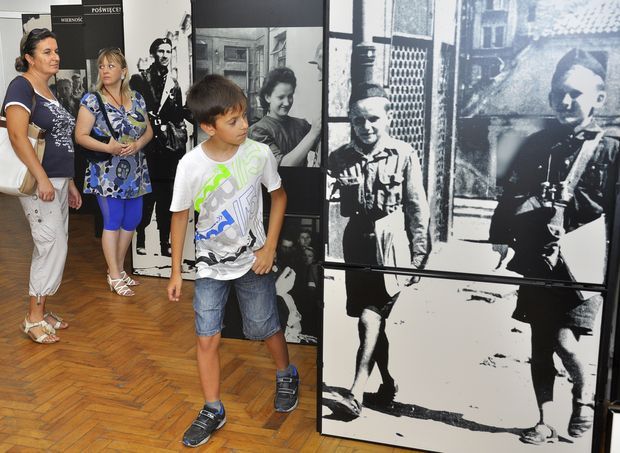In solidarity with Ukraine
Poles have brought an exhibition about the Warsaw Uprising of 1944 to Ternopil
A photo exhibition dedicated to the 70th anniversary of the Warsaw Uprising against the Nazi occupiers opened in Ternopil’s Peremoha Ukrainian House on August 6, commemorating a crucial and dramatic chapter in the history of Poland. Polish insurgents fought for their capital for 63 days, starting on August 1, 1944.
Love, Youth, Childhood, and Brotherhood are names of just a few sections of the exhibition. The photos show young people and even children, some just 9 or 11 years old... They smile and look happy and, if not for the chaos in the background, these would be ordinary photos, capturing happy moments in Varsovians’ lives. However, other sections of the exhibition picture pain and tragedy. By bringing the exhibition to Ukraine, its organizers intended to not only convey the heroism of the insurgents, but also show at the same time the Poles’ solidarity with the Ukrainians who are now experiencing war with Russia, which is a betrayal on the part of that neighboring country.
“The Poles also experienced a similar betrayal back in 1944,” representative of the Polish Institute of National Remembrance Jacek Pawlowicz stressed. “When the Poles fought for the freedom of our capital, the Red Army stood on the other bank of the Vistula and did nothing to help the insurgents. Help came from Italy, but planes with food supplies were prohibited from even landing on Soviet airfields. Those insurgents who subsequently fled Warsaw were arrested and deported to Stalin’s prison camps. We show photos of them as well, show Russia’s betrayal.”
Former political prisoner from Ternopil Hryhorii Moroz told The Day that veterans of the Warsaw Uprising were his fellow prisoners in a Stalin’s camp in the far north of the USSR in the mid-1950s. “It was in Inta, Komi Republic, in 1954-55. Ukrainians and Poles went on strikes and hunger strikes together, and died together as well,” he recalled.
For the Poles, the Warsaw Uprising was a major historical step toward independence. Consul of the Consulate General of the Republic of Poland in Lutsk Krzysztof Sawicki said that he was born 11 years after the Warsaw Uprising, but this event had played a significant role in his civic education. “I lived and studied in the shadow of the memory of the Warsaw Uprising, which the Communists wanted to erase or manipulate somehow. Fortunately, they have failed,” the consul noted.
In Ternopil, the exhibition enjoys assistance of the city council. It will be open till September 6. Deputy Mayor of Ternopil Vladyslav Stemkovsky stressed: “What is happening now in the east of Ukraine will become the subject of similar photos some day. For now, though, this tragedy is going on, and the Kremlin is again behind it. There are also questions about the position of some European countries. The Warsaw Uprising saw examples of both heroism and betrayal, and that is why it is still important.”






